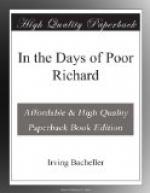“They are well. I bring you letters.”
“Come up to my office and we’ll give an hour to the news.”
When they were seated before the grate fire in the large, pleasant room above stairs whose windows looked out upon the Square, the young man said:
“First I shall give you, sir, a letter from Major Washington. It was entrusted to a friend of mine who came on the same ship with me. He was arrested at Deal but, fortunately, the letter was in my pocket.”
“Arrested? Why?”
“I think, sir, the charge was that he had helped to tar and feather a British subject.”
“Feathers and tar are poor arguments,” the Doctor remarked as he broke the seal of the letter.
It was a long letter and Franklin sat for near half an hour thoughtfully reading and rereading it. By and by he folded and put it into his pocket, saying as he did so: “An angry man can not even trust himself. I sent some letters to America on condition that they should be read by a committee of good men and treated in absolute confidence and returned to me. Certain members of that committee had so much gun powder in their hearts it took fire and their prudence and my reputation have been seriously damaged, I fear. The contents of those letters are now probably known to you.”
“Are they the Hutchinson, Rogers and Oliver letters?”
“The same.”
“I think they are known to every one in America that reads. We were indignant that these men born and raised among us should have said that a colony ought not to enjoy all the liberties of a parent state and that we should be subjected to coercive measures. They had expressed no such opinion save in these private letters. It looked like a base effort to curry favor with the English government.”
“Yes, they were overworking the curry comb,” said Franklin. “I had been protesting against an armed force in Boston. The government declared that our own best people were in favor of it. I, knowing better, denied the statement. To prove their claim a distinguished baronet put the letters in my hands. He gave me leave to send them to America on condition that they should not be published. Of course they proved nothing but the treachery of Hutchinson, Rogers and Oliver. Now I seem to be tarred by the same stick.”
Jack delivered sundry letters from the family of the great man who read them carefully.
“It’s good to hear from home,” he said when he had finished. “You’ve heard of the three Greenlanders, off the rocks and ice where there was not dirt enough to raise a bushel of cabbages or light enough for half the year to make a shadow, who having seen the world and its splendors said it was interesting, but that they would prefer to live at home?”
“These days America is an unhappy land,” said Jack. “We are like a wildcat in captivity—a growling, quarrelsome lot.”




